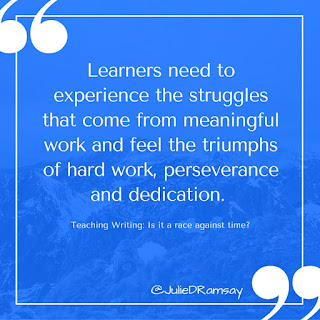I wish I had the answers to finding the time we need to not just rush through every student's writing, but truly devote the time that is needed for students to develop their own voices, experience (and learn from) the struggles of a writer, overcome those struggles, and fine tune their writing prowess. Since none of us have Hermione's time turner, I thought I would share some of the ways that I have found to save time without sacrificing the quality of the instruction and support each individual student needs to grow into a great writer.
One of the biggest commitments that we have is to provide our students with timely, personalized feedback. Like most of you, I would spend hours editing papers, writing feedback, often to have students ignore my suggestions when they went through a revision process. This is amplified when you have multiple classes of students. We want to give our students personalized and timely feedback so as to push their growth and keep the momentum of the writing project progressing, but there are only so many hours in the day.
 Through trial and error, I have discovered that if each of my students creates and shares a Google document where they compose/curate all of their writing from brainstorming, planning, drafting, revisions, and editing, I can type feedback comments into their document much faster than if I am writing them with pen and paper. An added bonus is that both the writer and I know what feedback has been left. When leaving feedback, I am focusing only on the standards that my writers are working on proving mastery of in that project. However, as I am reading and leaving feedback, I am making notes of patterns of error within their writing. If I see that a student is struggling with subject verb agreement, I will plan a special small group lesson and additional practice for that student until he/she demonstrates mastery of that skill.
Through trial and error, I have discovered that if each of my students creates and shares a Google document where they compose/curate all of their writing from brainstorming, planning, drafting, revisions, and editing, I can type feedback comments into their document much faster than if I am writing them with pen and paper. An added bonus is that both the writer and I know what feedback has been left. When leaving feedback, I am focusing only on the standards that my writers are working on proving mastery of in that project. However, as I am reading and leaving feedback, I am making notes of patterns of error within their writing. If I see that a student is struggling with subject verb agreement, I will plan a special small group lesson and additional practice for that student until he/she demonstrates mastery of that skill.When I shifted to using Google Docs, I found I had more time to contribute meaningful feedback to my students more frequently. It also afforded students the opportunity to receive feedback from their peers. Because it is in Google Docs, students can easily refer to the feedback when making revisions, weighing the ideas and making deliberate choices in their next draft. They can see the evolution of their growth throughout the project.
A second way, I've discovered for saving time while not sacrificing the quality of instruction was I stopped editing their writing. Now I know that there are a lot of English teachers (including an earlier me) who may be shocked by this idea. Here is my rationale: if we are changing, editing and rewriting their work, we impose our voice, ideas and opinions upon them. We steal the ownership of their writing. We take away crucial learning opportunities. As educators, we know that students learn by doing, failing, and retrying. Yet, as writing instructors, we tend to take that away. There is no wonder why so many students hate writing; we tell them we want them to have a voice and then we contradict ourselves by superseding our voice, opinions, and ideas onto their work.
For learning to be meaningful, students need to have that ownership. They need to have the creative license to write and create. Learners need to experience the struggles that come from meaningful work and feel the triumphs of hard work, perseverance and dedication. By providing them feedback on the side of Google Doc, conferring with them one-on-one, supporting them with small group mini-lessons, we are facilitating that type of environment for our students. We are providing them with the tools to master writing, while encouraging them to hone their voices.
Do these strategies and tools give us unlimited time with our writers? Unfortunately, no. But, they present us with more time to spend growing great writers while still focusing on best writing practices. And ultimately, isn't that what we want for our learners?
I'm always looking for new way to sharpen my teaching practice. I'd love to hear any time saving tip you have discovered that still affords you the ability to provide accomplished writing instruction to your students. Thanks in advance!
Further reading on related topics:
